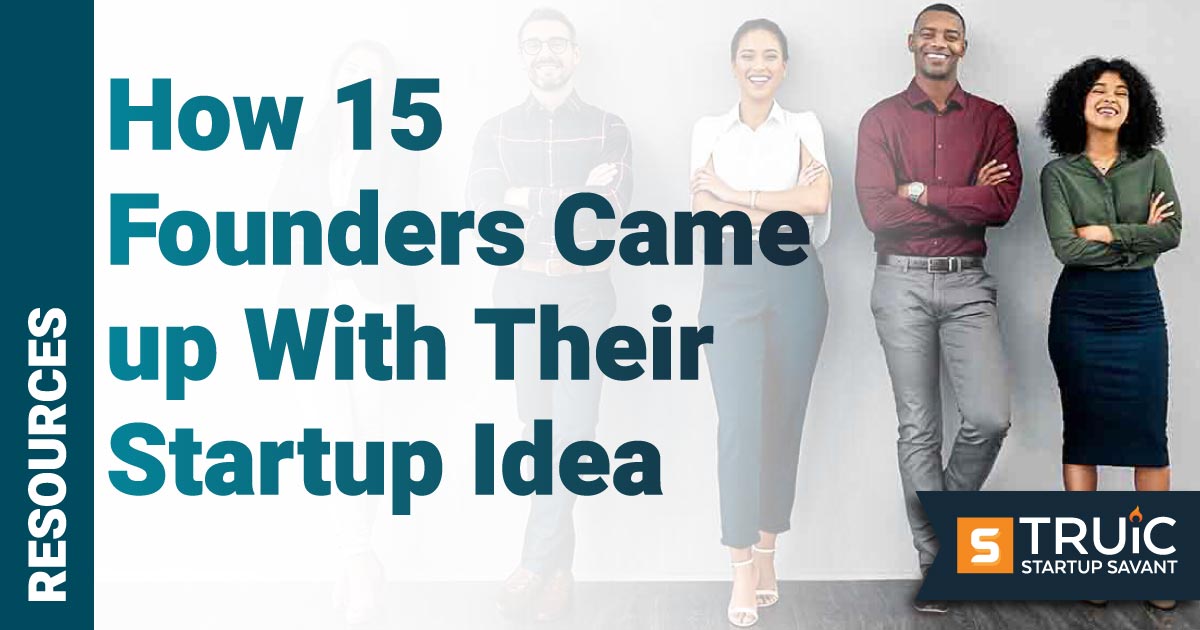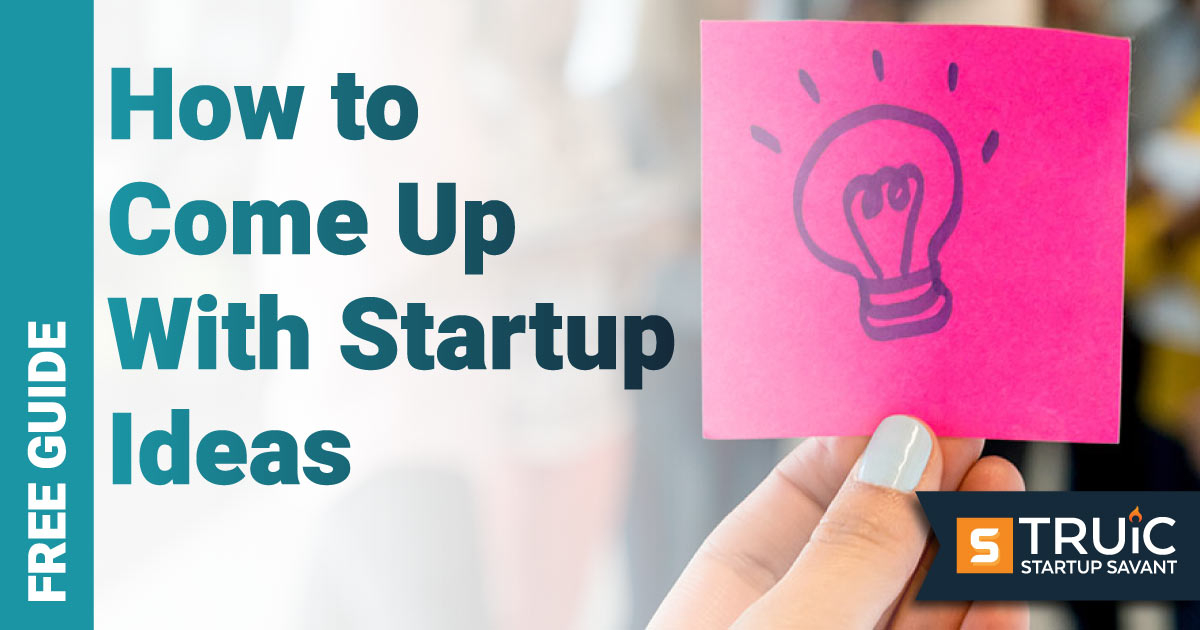How 15 Founders Came up With Their Startup Idea

Last Updated: By TRUiC Team
It may be hard to believe, but some of the most successful startup founders came up with their idea purely by accident or sheer luck. You don’t have to be a business mastermind to develop great startup ideas, and these successful entrepreneurs prove it. Here are the stories of how 15 founders came up with their startup idea.
Recommended: Check out our article on how to come up with startup ideas and our guide on how to start a startup.
15 Startup Idea Stories
Tech
Jan Koum: WhatsApp
WhatsApp, the popular communication app, was developed from an observation founder Jan Koum made while browsing the apple store — there were market opportunities available for entrepreneurs just like him. From there, Koum developed an idea for an app that would give your status to your contacts to let them know if you were available to chat. Not long after this, WhatsApp Inc. was created.
Alexis Ohanian and Steve Huffman: Reddit
A testament to not letting rejection get in the way of you achieving your goals, Reddit was born out of the founder’s original idea for a mobile food delivery app being rejected. When the pair was offered a second chance to pitch a startup idea to Y Combinator founder Paul Graham, they jumped at the chance. With some helpful advice from Graham, they started brainstorming about how to create a “frontpage for the internet,” and Reddit was created.
Evan Spiegel: Snapchat
Sometimes our best opportunities can come from unfortunate (or embarrassing) circumstances. The concept for Snapchat is a perfect example of this. When founder Evan Spiegel felt a lingering feeling of regret after sending a photo that he couldn’t take back, he came up with the idea for Snapchat to make messages, videos, and photos temporary — and regret-free.
Food & Beverage
Rob Rhinehart: Soylent
Many great startup ideas emerge from a founder’s solution for a personal problem, and Soylent is one of them. This nearly tasteless food substitute beverage was created when the founder, who was at the time a super busy entrepreneur, needed a quick but nutritious alternative to eating. To solve his problem, Rhinehart created Soylent, a beverage that can replace food for roughly $10 a day.
Tony Xu, Stanley Tang, Andy Fang, and Evan Moore: DoorDash
The idea for the food delivery app DoorDash occurred to its four founders after they developed an app for a small business in their city. After presenting the finished product, their customer pointed out that the only trouble was — she had no one to deliver all of the orders she was receiving through the app. This was the four partner’s “light bulb moment,” and the idea for an app that connects independent drivers to restaurant patrons to complete food delivery was born.
Jon Sebastiani: KRAVE Jerky
One of the traits of a great startup idea is that it challenges the status quo, and the concept for KRAVE Jerky did just that. KRAVE’s founder was searching for a high-protein, low-carb snack, and took note of the lack of variety in jerky compared to other snack options such as chips or bars. From this observation, he created a product that turned the stale, tired jerky industry into an artisanal snack experience.
Cosmetics & Personal Care
Hayley Barna and Katia Beauchamp: Birchbox
Subscription startups weren’t a new concept when the founders of Birchbox, the extremely successful beauty box subscription service, was launched. However, by brainstorming ways to combine ecommerce and the personal experience of buying beauty products, Birchbox’s founders were able to come up with the idea for a wildly successful beauty subscription startup.
Gregg Renfrew: Beautycounter
Beautycounter was born out of a concept that founder Gregg Renfrew wanted to see expand across the country — safe, nontoxic cosmetics. The idea for Beautycounter was born after Renfrew realized that if you want something done right, you should probably do it yourself, so she created the now successful line of products free of over 1,800 questionable ingredients.
Simon Enever: Quip
Great startup ideas can come from anywhere — even a visit to the dentist. Quip is a toothbrush startup that was founded by Simon Enever. After a visit to the dentist, Enever realized that there should be better options for electric toothbrushes that combat the damaging effects of brushing too hard. Enever identified the common issues with generic toothbrushes and created a product that solved the issue of poorly designed electric toothbrushes by creating Quip.
Ecommerce
David Barnett: PopSockets
The idea for PopSockets, the product you may have on the back of your phone right now, was born when David Barnett was tired of his iPhone’s headphone cord getting tangled in his pocket. This is a testament to the concept of developing a startup idea by looking for a solution to your own, everyday problems.
Neil Blumenthal, Dave Gilboa, Andy Hunt, and Jeff Raider: Warby Parker
A good, hard look at the eyewear industry led the founders of Warby Parker to the two problems they wanted to solve in the industry: the high cost of glasses and where you can get them. They got to work brainstorming solutions and came up with the idea for an inexpensive ecommerce eyewear startup.
Mark Levine and Michael Dubin: Dollar Shave Club
You might know Dollar Shave Club from their edgy, eye catching advertisements. The idea for this popular razor subscription service was born when the two founders were chatting at a party about how unnecessarily expensive razors were, so they decided to fix it by offering a cheaper, more convenient shaving solution.
Clothing & Fashion
Andy Dunn and Brian Spaly: Bonobos
When the founders of Bonobos had finally had enough with pants that just didn’t fit right, the idea for Bonobos emerged. They created a pair of pants that were more form-flattering and complimented the wearer, solving their problem and creating a hugely successful startup along the way.
Heidi Zak: ThirdLove
Frustrated with the limited bra sizes available to women, the founder of ThirdLove decided it was time for a better way for women to shop. That’s how the idea was born to shake up the industry by offering not only an unheard-of sizing range but by offering half sizes as well.
Diego Abba: Italist
Identifying an opportunity in the queues outside Italy’s luxury boutiques, the founder of Italist launched an online marketplace to bring Italian luxury goods to a global audience. By offering fine designer items at the "Italian retail price," Italist merges the exclusivity of Italian fashion with the accessibility of the internet.
The Takeaway
As you can see, unlikely entrepreneurs have created startups in a ton of different ways. The most common routes, however, are by solving a problem of their own, identifying an opening in a market to deliver a product or service that buyers aren’t currently getting, or by turning an industry on its head through innovation and a stroke of genius.


